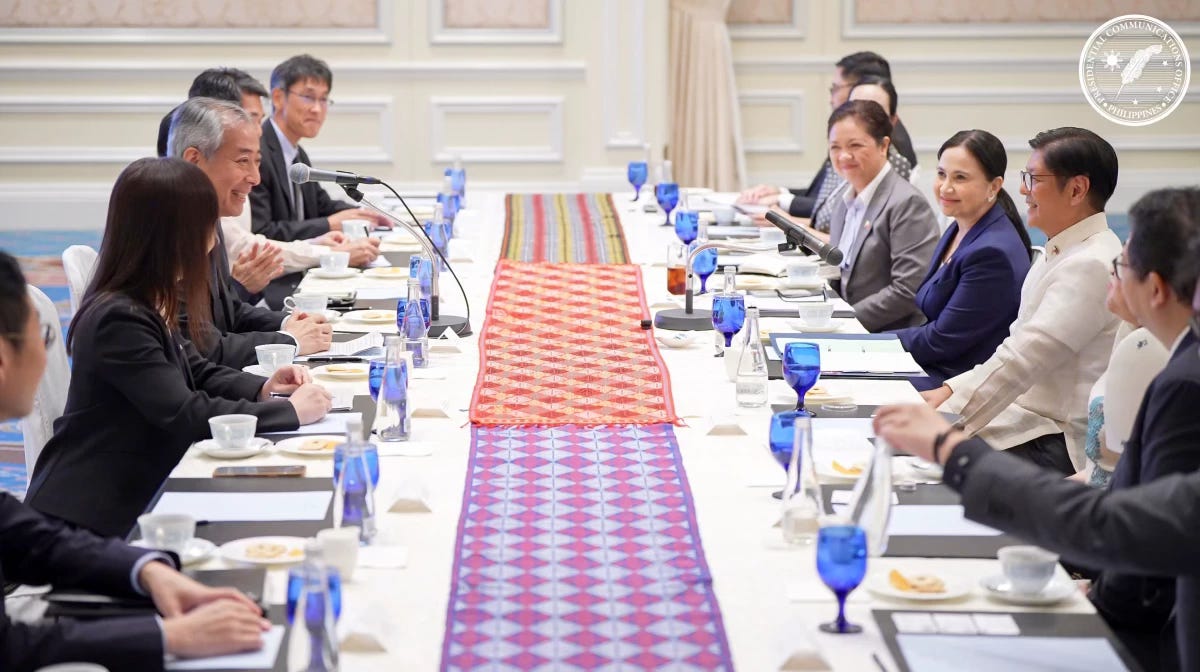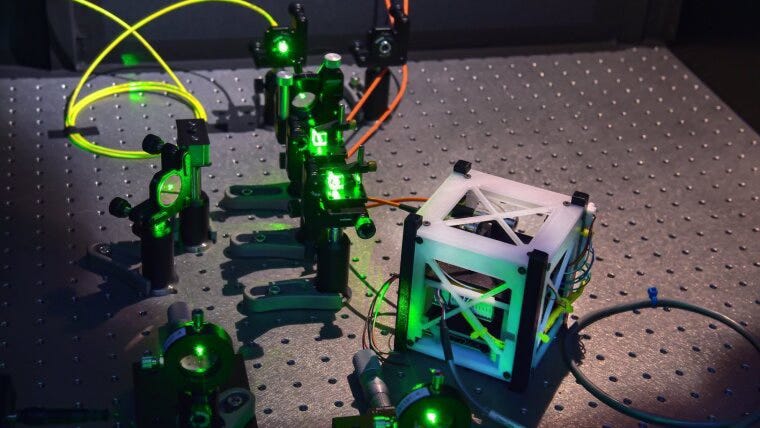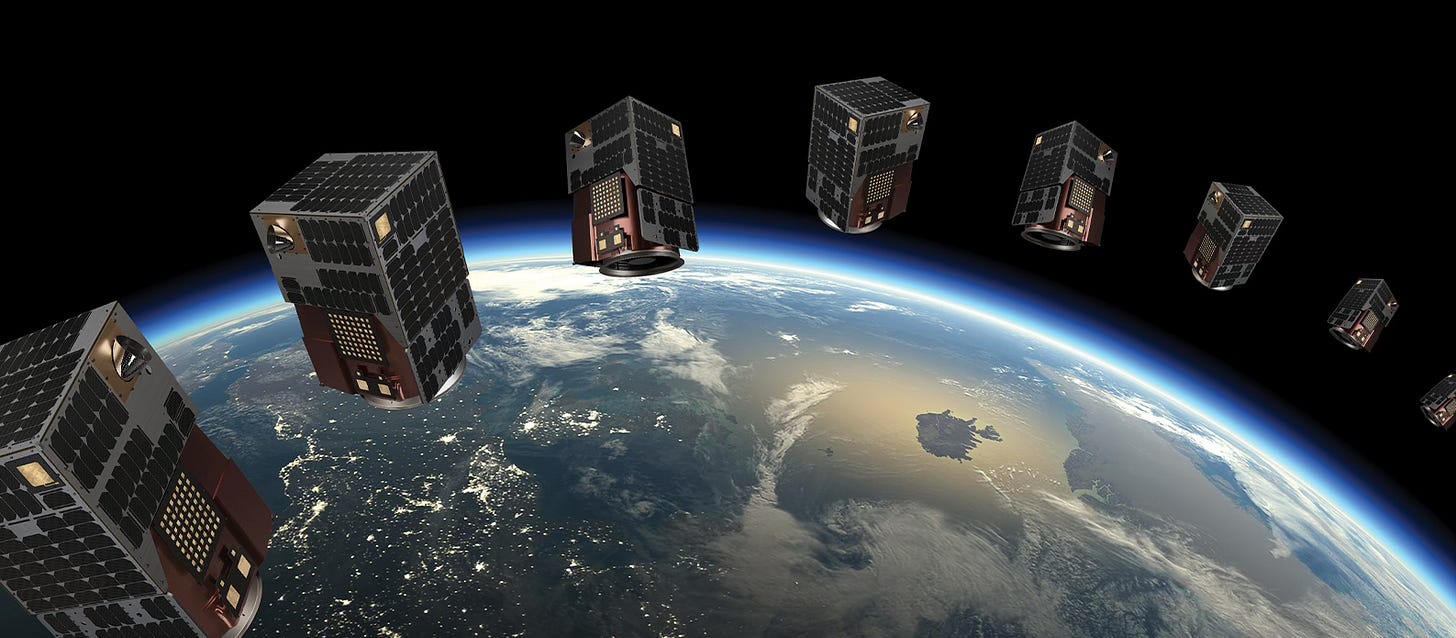Southeast Asia Space Roundup: 19 to 25 June 2025
A summary of all the space news in Southeast Asia over the past week, brought to you by AzurX
The following are the major space developments in the Southeast Asian region tracked by Southeast Asia Space Monitor over the past week:
Malaysia Selects Satellogic for Earth Observation Satellite
Malaysia’s Earth Observation Satellite Project Awarded to Uzma Berhad & Satellogic
Satellogic, a Latin American Earth observation satellite imaging and manufacturing company, has been selected as the technology partner for Malaysia’s High-Resolution Earth Observation Satellite Project (MHREOSP), supporting Uzma Berhad’s successful bid to lead the national initiative. The project will deliver a next-generation 50cm-resolution satellite leveraging Satellogic’s proven NewSat platform, with final integration and testing conducted in Malaysia to build local capacity. Aligned with Malaysia’s 2030 space vision, the partnership emphasizes sovereign space capabilities, technology transfer, and workforce development, marking a strategic expansion of Satellogic’s footprint in Asia and reinforcing its mission to democratize geospatial intelligence.
Philippines Space Developments

Philippines Deepens Space and Satellite Cooperation With Japan
The Philippines is deepening its space collaboration with Japan, as President Marcos confirmed after meeting with Japan Aerospace Exploration Agency (JAXA) officials in Osaka. This partnership, alongside efforts by the Philippine Space Agency (PhilSA), focuses on leveraging satellite technology for disaster response, agriculture, and national safety. Japan’s role builds on earlier support for the Philippines’ Diwata and Maya microsatellite programs, while the country’s larger Earth observation satellite, MULA - developed with UK-based Surrey Satellite Technology - is slated for launch via SpaceX’s Falcon 9 between late 2025 and early 2026. The Philippine space program now blends Japanese, UK, and U.S. partnerships with growing domestic engineering capacity.
Philippines to Develop National Communication Satellite & Earth Observation Constellation
The Philippine government has expanded its Public-Private Partnership (PPP) pipeline to 230 projects worth approximately $44.7 billion, with two significant space-related initiatives newly added: a $426 million telecommunications satellite development and a $119 million Earth observation satellite constellation, both led by the Philippine Space Agency (PhilSA). These projects underscore the country’s growing focus on space-based infrastructure for communication and Earth observation services. The updated list also includes major air navigation and port management projects, while nine lower-priority initiatives, including water, solar, and logistics programs, were delisted following agency reviews.
Philippines to Promote Space Sustainability During 2026 ASEAN Chairmanship
At the AMMSTI-21 meeting in Jakarta, Indonesia, ASEAN Secretary-General Dr. Kao Kim Hourn commended the Philippines for its leadership in science, technology, and innovation, highlighting its upcoming 2026 ASEAN Chairmanship and its planned regional initiative on sustainable outer space. This marks a notable step in ASEAN’s growing space policy engagement, with the Philippines positioning space sustainability alongside key economic and health priorities, reinforcing ASEAN’s strategic commitment to a resilient and technology-driven future.
Philippine Telco’s Object to New Law Allowing Foreign Satellite Operators Into Market
The Philippine Chamber of Telecommunication Operators (PCTO), representing major telcos like PLDT, Smart, Globe, and DITO, is urging President Marcos Jr. to veto the newly ratified Konektadong Pinoy Act, citing concerns that it would give foreign satellite providers - such as Starlink - a regulatory advantage over domestic operators. While the Act aims to expand broadband access and lower consumer costs by easing entry for data transmission and satellite players, PCTO argues it creates an uneven playing field by exempting new entrants from infrastructure and universal service obligations required of local telcos.
Philippines and Austria Discuss Space Cooperation
The Philippine Space Agency (PhilSA) hosted Austria’s Ambassador Johann Brieger for high-level talks on future space collaboration, focusing on satellite data applications for disaster response, environmental monitoring, and illegal activity prevention. Discussions also covered PhilSA’s ground infrastructure, space industry growth plans, and interest in developing spaceports. PhilSA expressed particular interest in Austria’s space strategy and business incubation models, inviting Austrian space firms to upcoming regional forums. The meeting aligns with broader diplomatic engagements, including the upcoming Philippines–Austria Political Consultations and the UN COPUOS session in Vienna.
Philippine Space Agency Hosts Nationwide Space Lecture Series by Prominent Filipino Astrophysicist
The Philippine Space Agency (PhilSA), in collaboration with the Fulbright Commission (PAEF), hosted MIT-based Filipino astrophysicist Dr. Joel Villasenor for a nationwide lecture series highlighting space technology advancements, including satellite missions like HETE-2 and innovations in reusable rockets. Dr. Villasenor’s talks, delivered at universities, schools, and industry forums, emphasized how these technologies are lowering barriers to space access and creating new opportunities for the Philippines. The initiative reflects PhilSA’s ongoing partnership with Fulbright to strengthen space education, STEM capacity, and U.S.-Philippines collaboration in space science and policy.
Philippines Appointed to International Mobile Satellite Organization’s Advisory Committee
Commander Mary Leizl C. Barbero of the Philippine Coast Guard has been elected Vice-Chair of the International Mobile Satellite Organization (IMSO) Advisory Committee for 2025–2026, highlighting the Philippines’ growing leadership in global maritime safety and satellite communications governance. Her appointment reflects international confidence in both her expertise - spanning maritime law, safety, and casualty investigation - and the Philippines’ broader commitment to advancing gender representation and strategic engagement in bodies overseeing critical systems like the Global Maritime Distress and Safety System (GMDSS) and Long-Range Identification and Tracking of Ships (LRIT).
Sweden Provides Space Science Scholarship for Women From the Philippines
Sweden’s Pioneering Women in STEM scholarship is advancing space sector diversity in the Philippines by supporting scholars like Katrina Baladjay, who will pursue a Master’s in Space Science and Technology at Luleå University of Technology. Her ambition to contribute to space industries that serve environmental and generational needs reflects Sweden’s dual commitment to space research excellence and gender equality. With nearly 50 Filipino students set to begin Master’s programs in Sweden - including in space science - the initiative underscores Sweden’s strategy of leveraging international talent to reinforce its leadership in space, sustainability, and innovation.
Indonesia Space News

Indonesia and Russia Discuss Expanding Cooperation in Space & Satellite Technology
During a meeting in St. Petersburg, Russia, Indonesia’s President Prabowo Subianto and Russian President Vladimir Putin discussed expanding bilateral cooperation, with space and satellite technology highlighted alongside agriculture, energy, and defense as key future focus areas. The dialogue signals Indonesia’s growing interest in strategic space partnerships with Russia, reinforcing Jakarta’s broader non-aligned foreign policy stance and its ambition to advance national capabilities across critical high-tech sectors, including space infrastructure and satellite services.
Indonesia Proposes Space Collaboration as One of Nine ASEAN Research Pillars
Indonesia’s National Research and Innovation Agency (BRIN) is positioning space and satellite technology as key pillars within its nine newly offered research collaboration platforms for ASEAN countries. Announced during the 87th ASEAN COSTI meeting in Jakarta, BRIN’s initiatives include joint projects in remote sensing, satellite-based environmental monitoring, and astronomical observation of the southern sky from Indonesia’s Timau Observatory. These space-focused efforts complement broader cooperation in nuclear technology, genomics, and biodiversity, and are aimed at enhancing Indonesia’s global scientific standing while fostering ASEAN-wide research integration in space sciences and satellite applications.
Indonesia Creates Consortium to Develop Satellite Antenna Technology
Indonesia’s PT Pasifik Satelit Nusantara (PSN) has signed a strategic partnership with BRIN and PT LEN Industri to co-develop phased array antenna technology for next-generation satellite ground stations. Announced at the Indo Defence Expo 2025, the collaboration aims to enhance national satellite infrastructure by combining PSN’s satellite operations expertise with LEN’s defense electronics capabilities. The initiative underscores Indonesia’s commitment to building a globally competitive and self-reliant satellite ecosystem, with phased array antennas positioned as a critical enabler of compact, precise, and resilient ground-based satellite communications.
Indonesia Loses French Arbitration Case Against Navayo Over Defense Satellite
Indonesia faces potential seizure of state assets in France after losing an arbitration dispute with Navayo International AG over a 2016 defense satellite procurement contract. Despite appointing legal counsel and pursuing diplomatic channels, including appeals and high-level talks with French officials, a French court has authorized asset seizures, including diplomatic residences. While Indonesia alleges Navayo failed to fulfill its obligations and is under domestic corruption investigation, the international arbitration ruling and ensuing legal enforcement underscore the high stakes of sovereign contract disputes and the vulnerabilities of state assets abroad.
Singapore Space Developments

Singapore and European Partners Launch QUICK³ Quantum Communications Satellite
Singapore’s role in advancing quantum-secure satellite communications took a key step with the launch of the QUICK³ nanosatellite, a joint research project between Germany, Italy, and the Southeast Asian city-state. The National University of Singapore contributed critical electronics to control the satellite’s quantum light source, part of the first-ever space test of single-photon technology on a micro-satellite platform. QUICK³ aims to validate quantum communication components and fundamental physics under space conditions, positioning Singapore as an active player in the emerging field of space-based quantum networks.
Singapore’s Addvalue Secures $2.1 Million Order for its SATCOM Data Relay Systems
Singapore-based Addvalue Technologies has secured $2.1 million in new orders from three undisclosed space industry clients for its Inter-Satellite Data Relay System (IDRS) terminals, boosting its order book to $10.6 million. The contracts, to be fulfilled over the next 12 months, are expected to materially impact the company’s current financial year. This follows strong FY2025 results, with full-year revenue rising 21.6% to $15.5 million and net profit increasing 62.2% to $1.95 million, reflecting growing demand for Addvalue’s satellite communications solutions.
Singapore’s Kacific Partners With PTCL & Telco Integrators for Pakistan Satellite Broadband
Singapore’s Kacific Broadband Satellites Group has signed an MoU with Pakistan Telecommunication Company Limited (PTCL) and Telco Integrators to deliver high-speed satellite broadband and voice services across Pakistan’s underserved regions. Leveraging PTCL’s extensive fiber and submarine cable infrastructure and Telco Integrators’ local operational expertise, Kacific will provide its satellite broadband technology to extend connectivity into remote areas. The partnership aims to jointly market Kacific’s services to telecom operators, SMEs, and enterprises, supporting Pakistan’s digital inclusion and economic development goals by addressing the broadband gap affecting over half the population.
Singapore Urged to Establish Dual-Use Procurement for Earth Observation Satellites
Singapore is increasingly turning to commercial Earth observation (EO) solutions to enhance disaster response, maritime security, and environmental monitoring, as highlighted in a recent GovInsider-Planet webinar. Industry experts urged Singapore’s civilian and defense agencies to establish joint procurement pathways, modernize legacy systems for seamless EO data integration, and enforce strong data access controls. The discussion reflects a broader Asia-Pacific trend toward "Space-as-a-Service" models, enabling countries like Singapore to access real-time satellite data without owning sovereign space assets - while still being encouraged to build national capabilities over the next decade.

Singapore’s DSTA Hosts BrainHack Where Teams Built CubeSat for Earth Observation
At Singapore’s BrainHack 2025, organized by the Defence Science and Technology Agency (DSTA), over 4,300 students engaged in technology-driven national defense challenges, including a space-focused satellite data exploitation competition where teams built and operated CubeSats for simulated Earth imaging missions. This space element, alongside AI, cybersecurity, and coding contests, underscored Singapore’s emphasis on developing youth expertise in emerging defense technologies like satellite operations and space-based intelligence. The event reflects Singapore’s strategic priority to cultivate homegrown capabilities in space data utilization and satellite technology as part of its broader defense innovation ecosystem.
Singapore Plays Central Role in Regional Satellite-Based Maritime Domain Awareness
The Indo-Pacific Partnership for Maritime Domain Awareness (IPMDA) exemplifies effective, non-treaty security collaboration among Quad countries, with Singapore playing a pivotal role as a regional data fusion hub. By integrating satellite tracking and maritime intelligence from centers including Singapore, the IPMDA enhances surveillance of illegal and unauthorized maritime activity across the Indo-Pacific. Singapore’s inclusion reflects its strategic importance in the regional maritime data ecosystem, reinforcing its position as a key node in advancing shared situational awareness and upholding a rules-based maritime order.
Vietnam Space News

Vietnam’s Health Ministry in Talks With Starlink for Satellite-Enabled Telemedicine
SpaceX, led by its Director of Enterprise Sales, Andrew Matlock, is advancing discussions with Vietnam’s Ministry of Health to deploy Starlink satellite internet across remote hospitals and clinics, supporting the country’s national digital health transformation. This follows SpaceX’s earlier announcement of a planned $1.5 billion investment in Vietnam’s broadband infrastructure, including 10–15 ground stations. The collaboration aims to address persistent connectivity gaps that hinder digital healthcare initiatives such as remote consultations, electronic medical records, and data center development in underserved regions.
Scientists from Vietnam & Poland Use Satellite Data to Monitor Maritime Environment
Scientists from Vietnam and Poland have pioneered a satellite-based system using Sentinel-2 data, AI, and cloud computing to monitor seawater quality in Ha Long Bay and Cua Luc - two critical marine zones threatened by pollution. Led by the Vietnam National Space Center (VNSC), the initiative integrates 78 satellite images with machine learning algorithms to generate high-resolution, seasonal water quality maps, offering early warnings and actionable insights. The project marks Vietnam's first comprehensive application of satellite remote sensing for environmental monitoring and aims to expand nationwide, establishing a scalable model for marine resource management and international space cooperation.
Other Regional Space Developments
Indonesia, Singapore, and Vietnam Increasingly Active in Space Situational Awareness
Indonesia, Singapore, and Vietnam are increasingly active in regional space situational awareness (SSA) initiatives amid growing orbital congestion and geopolitical tensions in the Indo-Pacific. Indonesia is set to boost its SSA capabilities with a new telescope at the Timau observatory, positioning itself as a key player in Southeast Asia’s space monitoring efforts. Singapore is advancing commercial SSA collaboration through an MoU between ST Engineering Geo-Insights and U.S.-based LeoLabs. Meanwhile, Vietnam, like its regional peers, remains reliant on strategic partnerships with the U.S. and others to strengthen its SSA infrastructure. These developments underscore a shift toward coordinated regional capacity-building in the absence of binding multilateral space traffic agreements.
Thailand’s THAICOM to Benefit From French $1.55 Billion Investment in Eutelsat
Eutelsat’s $1.55 billion capital injection from the French government has significantly strengthened its financial position, reducing debt concerns and potentially benefiting Thailand’s THAICOM, whose Thaicom-10 satellite derives approximately 50% of its revenue from Eutelsat. Analysts at Bualuang Securities suggest this development could ease investor worries about THAICOM’s revenue stability. Additionally, ongoing border tensions between Thailand and Cambodia may present THAICOM with further growth opportunities through ground security contracts, reinforcing its strategic positioning in the regional satellite services market.
Finnish Hyperspectral Satellite Company Kuva Space Expands Into Southeast Asia
Finland’s Kuva Space, a hyperspectral imaging company, has launched its second commercial satellite, Hyperfield-1B, with a strategic focus on expanding services across Southeast Asia and Australia. The 6U CubeSat, equipped with a patented hyperspectral camera and AI-powered analytics, aims to deliver near-real-time insights for agriculture, aquaculture, environmental monitoring, and maritime security—critical sectors for ASEAN’s $800+ billion agri-blue economy and coastal management needs. Kuva Space positions its technology as a solution to Southeast Asia’s chronic data gaps in field-level climate and ocean monitoring, offering faster detection of crop stress, illegal fishing, and environmental hazards.
China’s GalaxySpace Satellite Company Expands into Southeast Asia
China’s GalaxySpace is expanding its low-Earth orbit broadband satellite partnerships across Southeast Asia, with active collaborations in Indonesia, Malaysia, and Thailand. Notably, the company established a ground test station with Mahanakorn University in Thailand and has built multi-tier agreements with regional partners to deliver high-speed satellite internet, aiming to close the digital divide in underserved areas. As GalaxySpace scales its satellite manufacturing and broadband capabilities, its outreach into Indonesia and Malaysia signals a broader push to integrate Chinese commercial space technology into Southeast Asia’s digital infrastructure ambitions.
Be sure to catch up with space activities in the region in the next edition of Southeast Asia Space Monitor’s space roundup!
Follow Southeast Asia Space Monitor on X at: @SEAsia_Space and on BlueSky at: @seasiaspacemonitor.bsky.social







